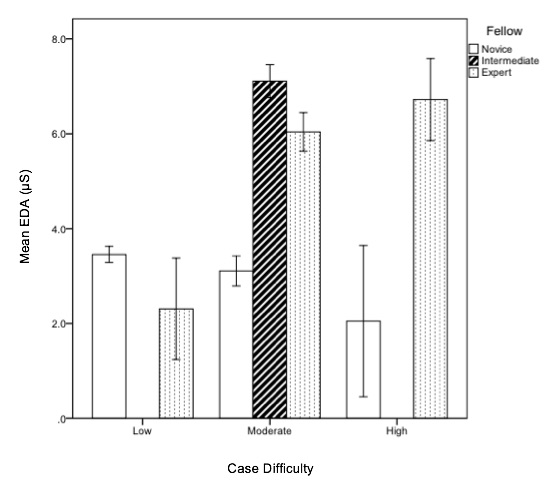Unusual Suspects: Real Time Physiological Evaluation of Stressors during Laparoscopic Donor Nephrectomy
1, Psychology and Center for Education Research & Innovation, Western University, London, ON, Canada, 2Surgery, Western University, London, ON, Canada
Meeting: 2019 American Transplant Congress
Abstract number: B256
Keywords: Donation, Kidney transplantation
Session Information
Session Name: Poster Session B: Kidney Living Donor: Quality and Selection
Session Type: Poster Session
Date: Sunday, June 2, 2019
Session Time: 6:00pm-7:00pm
 Presentation Time: 6:00pm-7:00pm
Presentation Time: 6:00pm-7:00pm
Location: Hall C & D
*Purpose: Stress is an important physiological response influenced by cognitive and emotional state. Faculty surgeons must balance teaching with ensuring good patient outcomes. Electrodermal activity (EDA) is an objective index of changes in sympathetic arousal. The purpose of this study was to document the variability of faculty surgeon EDA peaks during laparoscopic donor nephrectomy (LDN) to determine the effect of case difficulty and learner expertise on the stress response. We hypothesized that operating with more novice learners, particularly during difficult cases, would result in higher EDA peaks in faculty.
*Methods: EDA for a single faculty surgeon (11yr experience) was captured over 10 LDN cases using an Empatica E4 wristband worn under the sterile gown. During each case, one of three transplant fellows (novice, intermediate, or expert level of lap expertise) participated. Difficulty was rated pre-op as “low/moderate/high” by the faculty. Using software, EDA peaks were collected and analyzed. The frequency and magnitude of EDA peaks (microSiemens, μS), case difficulty, and fellow expertise were compared using a two-way factorial ANOVA.
*Results: The effect of learner expertise was significant (F (2, 848)=18.10, p=0.001). The effect of difficulty rating was not significant (F (2, 848)=2.38, p=0.093), however the interaction of difficulty and expertise on faculty EDA peaks was significant (F (2, 848)=4.55, p=0.011). Tukey post hoc analysis reveals that overall, expert learners resulted in significantly higher mean EDA (7.1±3.8μS,p<0.001) compared to intermediate (6.2±3.5μS, p<0.001) and novice fellows (3.3±0.8μS, p<0.001). The figure shows elevated faculty EDA in moderate/high difficulty cases when intermediate and expert fellows were involved. Novice fellows did not result in higher levels of EDA on moderate/difficult cases but did result in higher faculty EDA levels compared to more expert fellows on low difficulty cases.
*Conclusions: This is the first report showing variability in surgeon EDA across cases of varying difficulty and with learners of varying expertise during a high stakes operation. Case difficulty did not appear to independently contribute to stress. Contrary to our hypothesis, EDA levels were inversely proportional to the expertise of the learner and case difficulty, suggestive of a significant impact of learner autonomy on faculty stress response. These data may help shape future faculty development and training.
To cite this abstract in AMA style:
Wilson CA, Chahine S, Cristancho S, Aquil S, Mandurah M, Levine MA, Sener A. Unusual Suspects: Real Time Physiological Evaluation of Stressors during Laparoscopic Donor Nephrectomy [abstract]. Am J Transplant. 2019; 19 (suppl 3). https://atcmeetingabstracts.com/abstract/unusual-suspects-real-time-physiological-evaluation-of-stressors-during-laparoscopic-donor-nephrectomy/. Accessed February 13, 2026.« Back to 2019 American Transplant Congress

